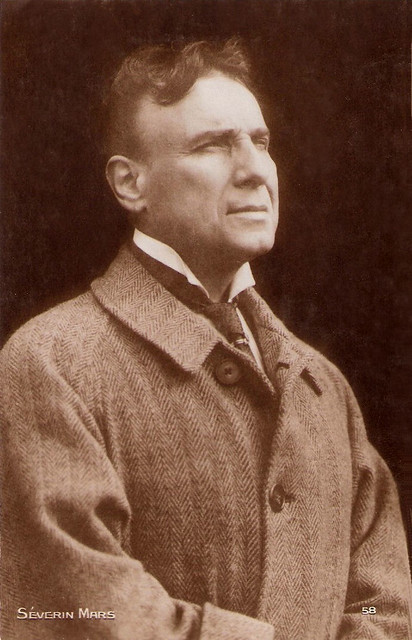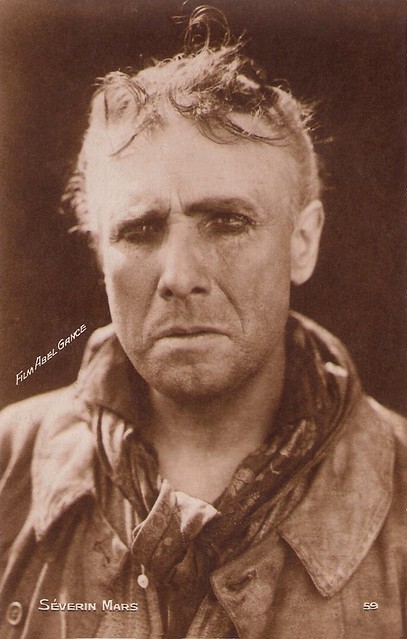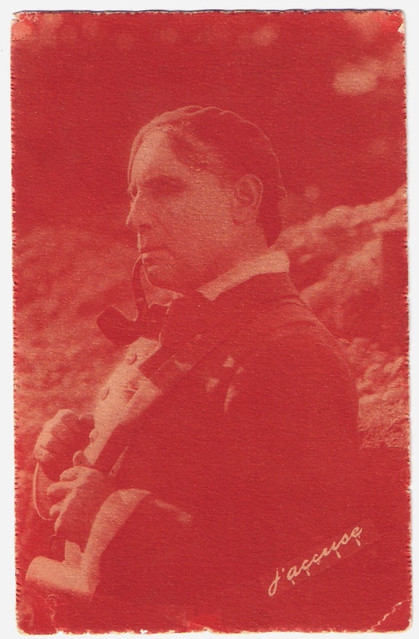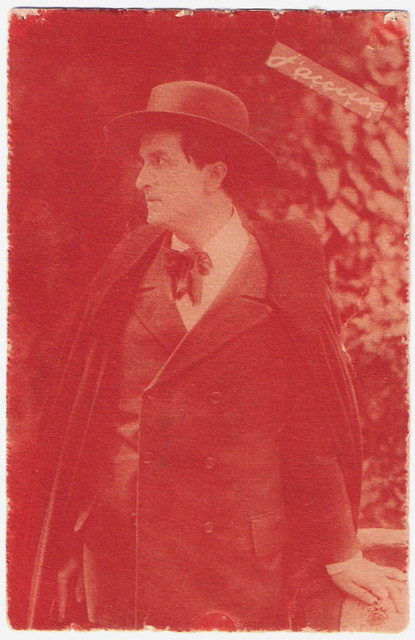French actor Séverin-Mars (1873-1921) had a very short film career, but he played in two masterpieces by innovative film pioneer Abel Gance: the First World War drama J'accuse! (1919), and the epic and touching drama La Roue (1921-1923).

French postcard by Cinémagazine, no. 58.

French postcard by Cinémagazine, no. 59.
Séverin-Mars was born as Armand Jean de Malafayde in Bordeaux, France in 1873.
In 1910 he made his film debut in Le crime de grand-père/The Crime of a Grandfather (1910), a Gaumont production directed by Léonce Perret and scripted by Abel Gance, who would become his favourite director.
Séverin-Mars appeared in such silent shorts as Le duel du fou/The Duel of the Madman (1913), Macbeth (1915), Trois familles/Three Families (Alexandre Devarennes, 1918), and L'habit de Béranger/Béranger's Habit (Maurice Mariaud, 1918).
He had his breakthrough in a feature film: Abel Gance's melodrama La dixième symphonie/The Tenth Symphony (produced in 1917, but released in November 1918, just before the end of the war).
In this film he played a composer who is unknowing of the adventurous past of his wife (Emmy Lynn). She is blackmailed by her former lover (Jean Toulout) to consent to the marriage between her ex and her daughter. When the composer realizes what is happening, he writes a symphony of pain.
Séverin-Mars appeared next in La nuit du 11 septembre/The Night of September 11 (Dominique Bernard-Deschamps, 1919), with Russian actress Vera Karalli, and in Jacques Landouze (André Hugon, 1919), again with Jean Toulout.

French postcard for J'accuse (1919).

Romuald Joubé in J'Accuse.
Then Séverin-Mars played the lead in the classic after anti-war film J'accuse!/I Accuse (Abel Gance, 1919). In J'accuse! he is the stubborn brute François Laurin, who maltreats his wife Edith (Maryse Dauvray). She feels more for the gentle poet Jean Diaz (Romuald Joubé). The threesome seems to explode, when the war breaks out. The men meet again in the trenches, bond and share their love for Edith. Meanwhile she is raped by German soldiers and returns to the village with a child.
Mars goes from sadism to jealousy to rage to lucidity to heroism and to sacrifice, displaying intense emotions without any histrionic acting. The film was a success because it was the first production to show real footage of the carnage of the war. Abel Gance had been filming in the trenches in 1918, after having served there. In 1937, Gance would create a masterful remake of this film.
After J'accuse! Séverin-Mars played in Haceldama ou Le prix du sang/Haceldama or The Price of Blood (1919) directed and written by the debuting Julien Duvivier. Haceldama is a French western, driven by revenge and lust for money.
In 1921 Séverin-Mars was very active. With Jean Legrand he co-directed his first film, Le coeur magnifique/The Magnificent Heart. For this film he also had written the script, and he played the lead opposite France Dhélia and Léon Bernard. It was the story of a marquis who, disgusted by an immoral woman, finds love and peace with the neighbour's daughter.
With Gaby Morlay, he co-starred in L'agonie des aigles/The Death Agony of the Eagles (Julien Duvivier, Dominique Bernard-Deschamps, 1921). The film, based on a novel by Georges Desparbès, deals with a man who protects the King of Rome, Napoleon II, the son of the famous French Emperor. The gala premiere was at the Paris Opéra and coincided with the birthday of Napoleon I; it was a charity night to help war widows and orphans.

French postcard by Sadag de France, Imp., Paris, no. 109. Photo: publicity still for the film J'Accuse (Abel Gance 1919), starring Séverin-Mars. Here he is the ghost of the dead soldiers who resurrect at the end of the film, and come to the survivors, asking them whether the war was worth fighting for.

Romuald Joubé and Maryse Dauvray in J'Accuse. Romuald Joubé. French postcard by Sadag de France, Imp., Paris, no. 109.
An Epic of Eight Hours
Séverin-Mars' last role was also his most famous one: the railwayman Sisif in the anti-war epic La Roue/The Wheel (Abel Gance, 1923). Sisif falls in love with his foster-daughter Norma (Ivy Close), who he once had saved from a train wreck and raised like his daughter. Sisif's son Elie (Gabriel de Gravone) loves Norma too.
The epic film originally ran nine hours. Abel Gance later explained that his companion Ida Danis was struck by tuberculosis while he was surviving the Spanish flu during the preparation of La Roue in 1920. Her need for recovery brought the crew to constant different places, while Gance adapted the narrative to Ida's needs. La Roue, begun on the first day of her illness, was finished on the day of her death.
Abel Gance disappeared to the States for four months, angering the Pathé company. His discovery of the American fast paced editing made him change La Roue entirely. After a full year of editing, La Roue was finally shown in 1923 appalling critics and audiences.
Despite its 8 hours length it was hailed as such a masterpiece that audiences cried for more. Abel Gance later wrote: "The only thing we could think of was to show the last reel again." For the general release in 1924 the film was cut back to 130 minutes.
During the shooting of La Roue, Séverin-Mars had also become ill. Just after the production was finished, he died of a heart attack in July 1921 in Courgent, France. His favourite director heard the news in the US, and wrote in his diary: "I cried like a child."
Sources: Kevin Brownlow (The Parade's Gone By), Janiss Garza (AllMovie) and IMDb.

French postcard by Cinémagazine, no. 58.

French postcard by Cinémagazine, no. 59.
A Symphony of Pain
Séverin-Mars was born as Armand Jean de Malafayde in Bordeaux, France in 1873.
In 1910 he made his film debut in Le crime de grand-père/The Crime of a Grandfather (1910), a Gaumont production directed by Léonce Perret and scripted by Abel Gance, who would become his favourite director.
Séverin-Mars appeared in such silent shorts as Le duel du fou/The Duel of the Madman (1913), Macbeth (1915), Trois familles/Three Families (Alexandre Devarennes, 1918), and L'habit de Béranger/Béranger's Habit (Maurice Mariaud, 1918).
He had his breakthrough in a feature film: Abel Gance's melodrama La dixième symphonie/The Tenth Symphony (produced in 1917, but released in November 1918, just before the end of the war).
In this film he played a composer who is unknowing of the adventurous past of his wife (Emmy Lynn). She is blackmailed by her former lover (Jean Toulout) to consent to the marriage between her ex and her daughter. When the composer realizes what is happening, he writes a symphony of pain.
Séverin-Mars appeared next in La nuit du 11 septembre/The Night of September 11 (Dominique Bernard-Deschamps, 1919), with Russian actress Vera Karalli, and in Jacques Landouze (André Hugon, 1919), again with Jean Toulout.

French postcard for J'accuse (1919).

Romuald Joubé in J'Accuse.
From Sadism To Jealousy To Rage
Then Séverin-Mars played the lead in the classic after anti-war film J'accuse!/I Accuse (Abel Gance, 1919). In J'accuse! he is the stubborn brute François Laurin, who maltreats his wife Edith (Maryse Dauvray). She feels more for the gentle poet Jean Diaz (Romuald Joubé). The threesome seems to explode, when the war breaks out. The men meet again in the trenches, bond and share their love for Edith. Meanwhile she is raped by German soldiers and returns to the village with a child.
Mars goes from sadism to jealousy to rage to lucidity to heroism and to sacrifice, displaying intense emotions without any histrionic acting. The film was a success because it was the first production to show real footage of the carnage of the war. Abel Gance had been filming in the trenches in 1918, after having served there. In 1937, Gance would create a masterful remake of this film.
After J'accuse! Séverin-Mars played in Haceldama ou Le prix du sang/Haceldama or The Price of Blood (1919) directed and written by the debuting Julien Duvivier. Haceldama is a French western, driven by revenge and lust for money.
In 1921 Séverin-Mars was very active. With Jean Legrand he co-directed his first film, Le coeur magnifique/The Magnificent Heart. For this film he also had written the script, and he played the lead opposite France Dhélia and Léon Bernard. It was the story of a marquis who, disgusted by an immoral woman, finds love and peace with the neighbour's daughter.
With Gaby Morlay, he co-starred in L'agonie des aigles/The Death Agony of the Eagles (Julien Duvivier, Dominique Bernard-Deschamps, 1921). The film, based on a novel by Georges Desparbès, deals with a man who protects the King of Rome, Napoleon II, the son of the famous French Emperor. The gala premiere was at the Paris Opéra and coincided with the birthday of Napoleon I; it was a charity night to help war widows and orphans.

French postcard by Sadag de France, Imp., Paris, no. 109. Photo: publicity still for the film J'Accuse (Abel Gance 1919), starring Séverin-Mars. Here he is the ghost of the dead soldiers who resurrect at the end of the film, and come to the survivors, asking them whether the war was worth fighting for.

Romuald Joubé and Maryse Dauvray in J'Accuse. Romuald Joubé. French postcard by Sadag de France, Imp., Paris, no. 109.
An Epic of Eight Hours
Séverin-Mars' last role was also his most famous one: the railwayman Sisif in the anti-war epic La Roue/The Wheel (Abel Gance, 1923). Sisif falls in love with his foster-daughter Norma (Ivy Close), who he once had saved from a train wreck and raised like his daughter. Sisif's son Elie (Gabriel de Gravone) loves Norma too.
The epic film originally ran nine hours. Abel Gance later explained that his companion Ida Danis was struck by tuberculosis while he was surviving the Spanish flu during the preparation of La Roue in 1920. Her need for recovery brought the crew to constant different places, while Gance adapted the narrative to Ida's needs. La Roue, begun on the first day of her illness, was finished on the day of her death.
Abel Gance disappeared to the States for four months, angering the Pathé company. His discovery of the American fast paced editing made him change La Roue entirely. After a full year of editing, La Roue was finally shown in 1923 appalling critics and audiences.
Despite its 8 hours length it was hailed as such a masterpiece that audiences cried for more. Abel Gance later wrote: "The only thing we could think of was to show the last reel again." For the general release in 1924 the film was cut back to 130 minutes.
During the shooting of La Roue, Séverin-Mars had also become ill. Just after the production was finished, he died of a heart attack in July 1921 in Courgent, France. His favourite director heard the news in the US, and wrote in his diary: "I cried like a child."
Sources: Kevin Brownlow (The Parade's Gone By), Janiss Garza (AllMovie) and IMDb.
1 comment:
thanks! I'm watching La Roue and was looking for more info on an actor with such a distinctive face.
Post a Comment